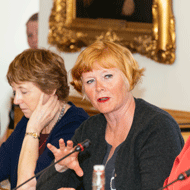VN Council approves advanced nursing qualifications

It is hoped that once enough members of the profession have completed the certificate, it could act as a pathway to formal Advanced Veterinary Nurse status.
VN Council has approved two advanced veterinary nursing qualifications, following a VN Futures recommendation to open up new career paths for veterinary nurses.
Proposals for the new qualifications were developed by a working group and consulted on last year, after the 2016 VN Futures report concluded that the RCVS and BVNA should canvas opinion on post-qualification awards for nurses.
The final stage of the process saw VN Council approve the two new qualifications; the Level 6 Graduate Certificate in Advanced Veterinary Nursing and a Level 7 Postgraduate Certificate in Advanced Veterinary Nursing.
VN Council chair Rachael Marshall described the move as a “fantastic development for veterinary nursing”.
The RCVS said the qualifications differ from the previous Diploma in Advanced Veterinary Nursing, in that they are more focused and specific to a veterinary nurse’s subject of choice. In addition, each is a 60 credit qualification rather than 120 credits.
Rachael Marshall added: “By allowing greater focus on particular designated areas of practice I think these courses will really open up some significant opportunities for VNs, who can choose to go down a designated path, whether that is in, for example, anaesthesia, emergency & critical care, pharmacology or even non-clinical routes such as education and teaching, research skills and leadership.
“This is a great step forward for the profession and we look forward to working to develop the first Certificate in Advanced Veterinary Nursing courses and seeing the first cohort of veterinary nurses sign-up to it.”
It is hoped that once enough members of the profession have completed the certificate, it could act as a pathway to formal Advanced Veterinary Nurse status.
Further information can be found in the VN Council committee papers. Any veterinary nurses or higher further education institutions who are interested in the certificate should contact vetnursing@rcvs.org.uk or 020 7202 0788.



 The Federation of Independent Veterinary practices (FIVP) has announced a third season of its podcast, Practice Matters.
The Federation of Independent Veterinary practices (FIVP) has announced a third season of its podcast, Practice Matters.